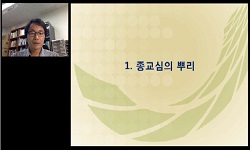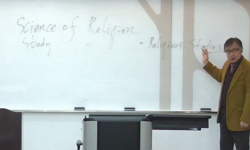The goal of this article is to examine the connection between creativity of unconscious and religion. Jung criticized how Freud``s approach in studying the unconscious as a scientific inquiry focuses on the unconscious as reflecting only those which i...
http://chineseinput.net/에서 pinyin(병음)방식으로 중국어를 변환할 수 있습니다.
변환된 중국어를 복사하여 사용하시면 됩니다.
- 中文 을 입력하시려면 zhongwen을 입력하시고 space를누르시면됩니다.
- 北京 을 입력하시려면 beijing을 입력하시고 space를 누르시면 됩니다.
무의식의 창조성과 종교: 그리스도교를 중심으로 = Creativity of the Unconscious and Religion: Focusing on Christianity
한글로보기https://www.riss.kr/link?id=A99924067
- 저자
- 발행기관
- 학술지명
- 권호사항
-
발행연도
2011
-
작성언어
-
-
주제어
무의식 ; 창조성 ; 종교 ; 그리스도교 ; 삼위일체 ; 선과 악 ; Unconscious ; Creativity ; Religion ; Christianity ; Trinity ; Good and evil
-
KDC
100
-
자료형태
학술저널
-
수록면
36-66(31쪽)
- 제공처
-
0
상세조회 -
0
다운로드
부가정보
다국어 초록 (Multilingual Abstract)

The goal of this article is to examine the connection between creativity of unconscious and religion. Jung criticized how Freud``s approach in studying the unconscious as a scientific inquiry focuses on the unconscious as reflecting only those which is repressed by the ego. Jung conceived of the unconscious as encompassing not only the repressed but also the variety of other psychic materials that have not reached the threshold of the consciousness in its range. Moreover, since human psyche is as individualistic as is a collective phenomenon, the collective psyche is thought to be pervasive at the bottom of the psychic functioning and the conscious and the personal unconscious comprising the upper level of the psychic functioning. Through clinical and personal experience, Jung had come to a realization that the unconscious has the self-regulatory function. The unconscious can make demands and also can retract its demands. Jung saw this as the autonomous function of the unconscious. And this autonomous unconscious creates, through dreams and fantasies, images that include an abundance of ideas and feelings. These creative images the unconscious produces assist and lead the individuation process which leads to the discovery of the Self. Because this unconscious process compensates the conscious ego, it has the necessary ingredients for self-regulation and can function in a creative and autonomous fashion. Jung saw religion as a special attitude of human psyche, which can be explained by careful and diligent observation about a dynamic being or action, which Rudolph Otto called the Numinosum. This kind of being or action does not get elicited by artificial or willful action. On the contrary, it takes a hold and dominates the human subject. Jung distinguished between religion and reli gious sector or denomination. He explained religious sector as reflecting the contents of sanctified and indoctrinated religious experiences. It is fixated in the complex organization of ritualized thoughts. And this ritualization gives rise to a system that is fixated. There is a clear goal in the religious sector to replace intellectual experiences with firmly established dogma and rituals. Religion as Jung experienced is the attitude of contemplation about Numinosum, which is formed by the images of the collective unconscious that is propelled by the creativity and autonomy of the unconscious. Religious sector is a religious community that is formed by these images that are ritualized. Jung saw religion as the relationship with the best or the uttermost value. And this relationship has a duality of being involuntary and reflecting free will. Therefore people can be influenced by one value, overcome with the unconscious being charged with psychic energy, or could accept it on a conscious level. Jung saw God as the dominating psychic element among humans or that psychic reality itself. Although Jung grew up in the atmosphere of the traditional Swiss reformed church, it does not seem that he considered himself to be a devoted Christian. To Jung, Christianity is a habitual, ritualized institution, which lacked vitality because it did not have the intellectual honesty or spiritual energy. However, Jung``s encounter with the dramatic religious experience at age 12 through hallucination led him to perceive the existence of living god in his unconscious. This is why the theological questions and religious problems in everyday life became Jung``s life-long interest. To this author, the reason why Jung delved into problems with religion has to do with his personal interest and love for the revival of the Christian church which had lost its spiritual vitality and depth and had become heavily ritualized.
동일학술지(권/호) 다른 논문
-
- 한국분석심리학회
- 박효인 ( Hyo In Park )
- 2011
-
- 한국분석심리학회
- 강철중 ( Cheol Joong Kang )
- 2011




 KISS
KISS






